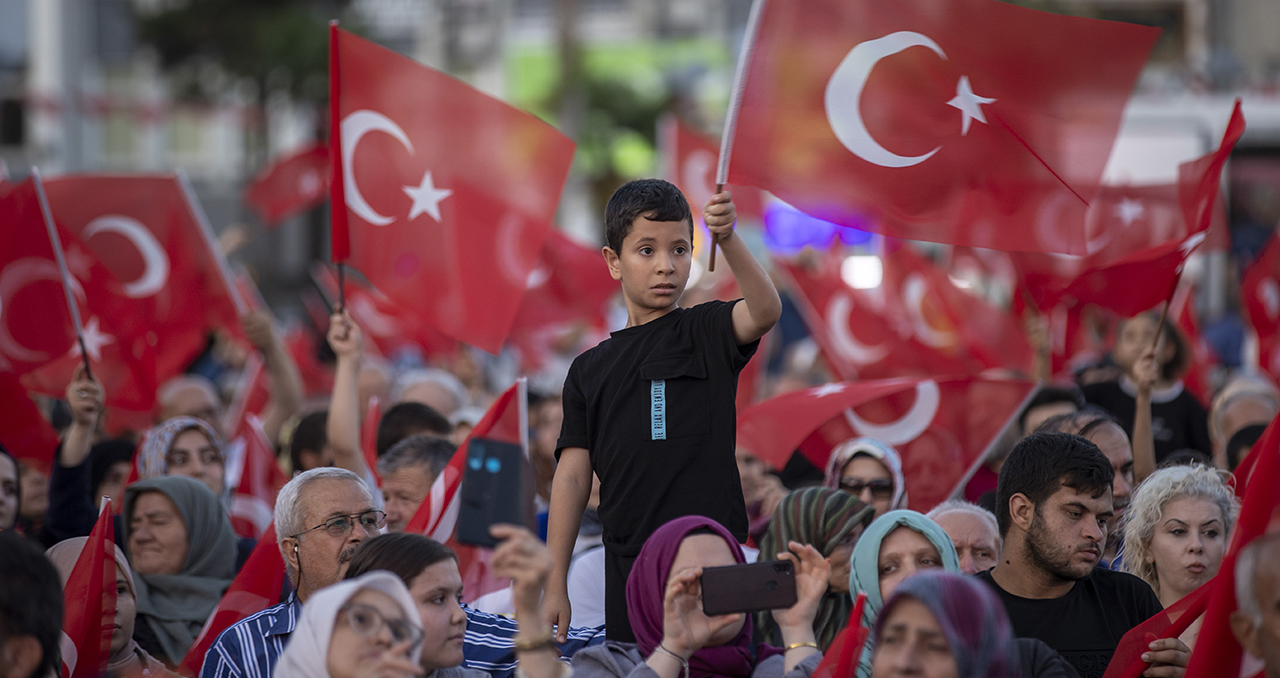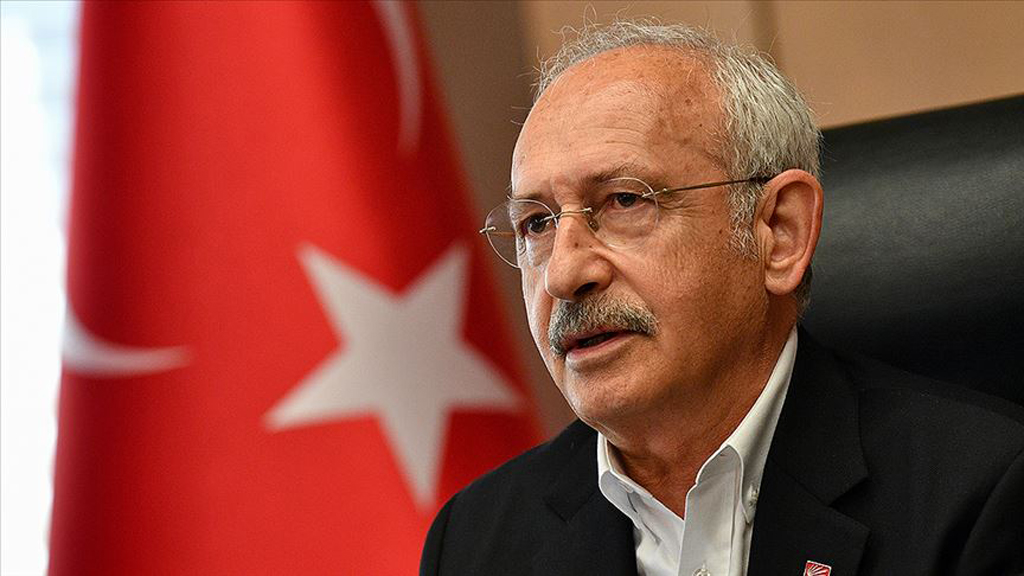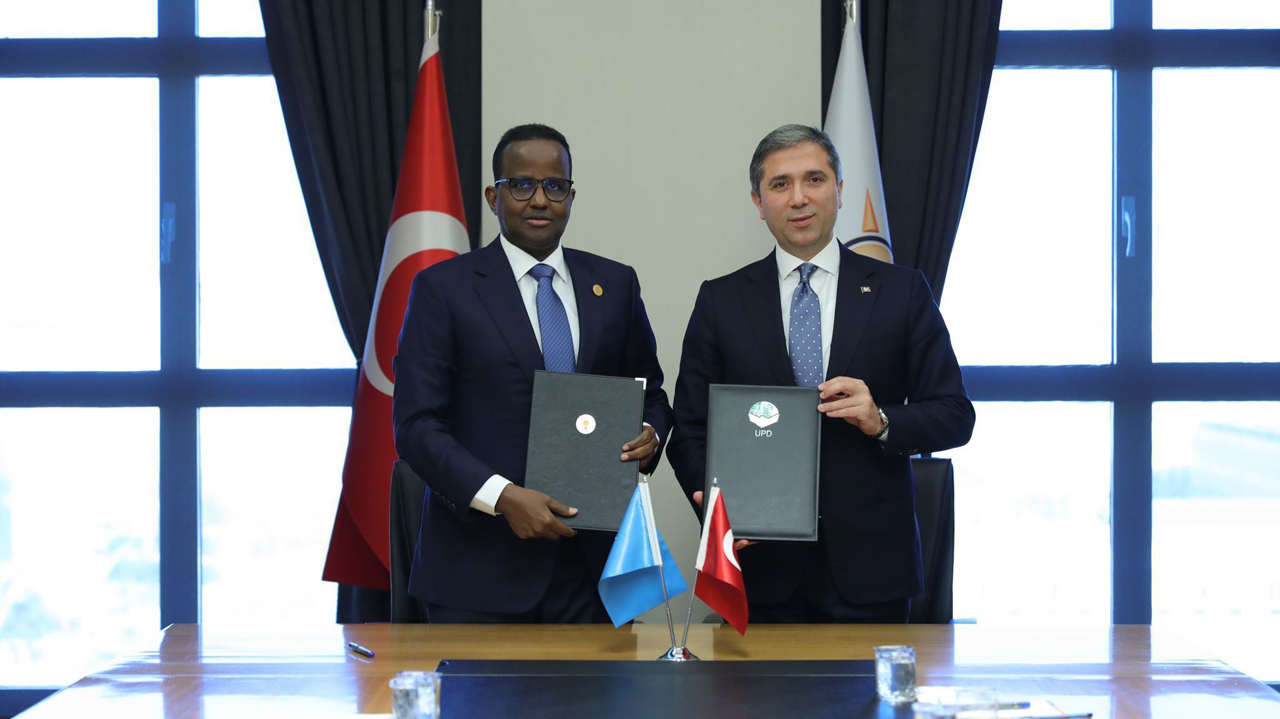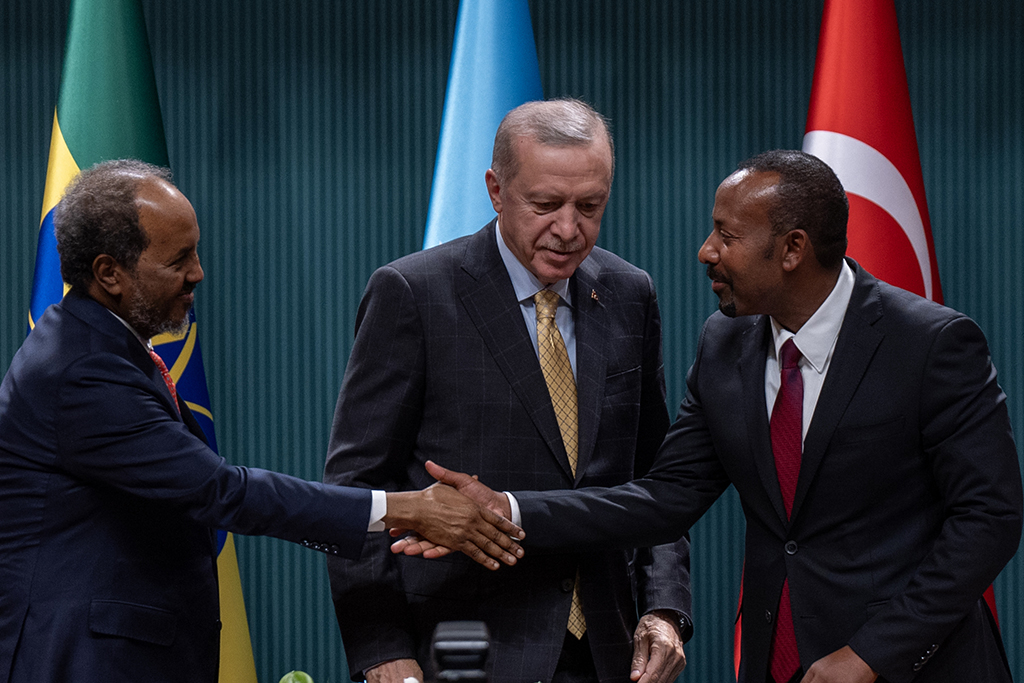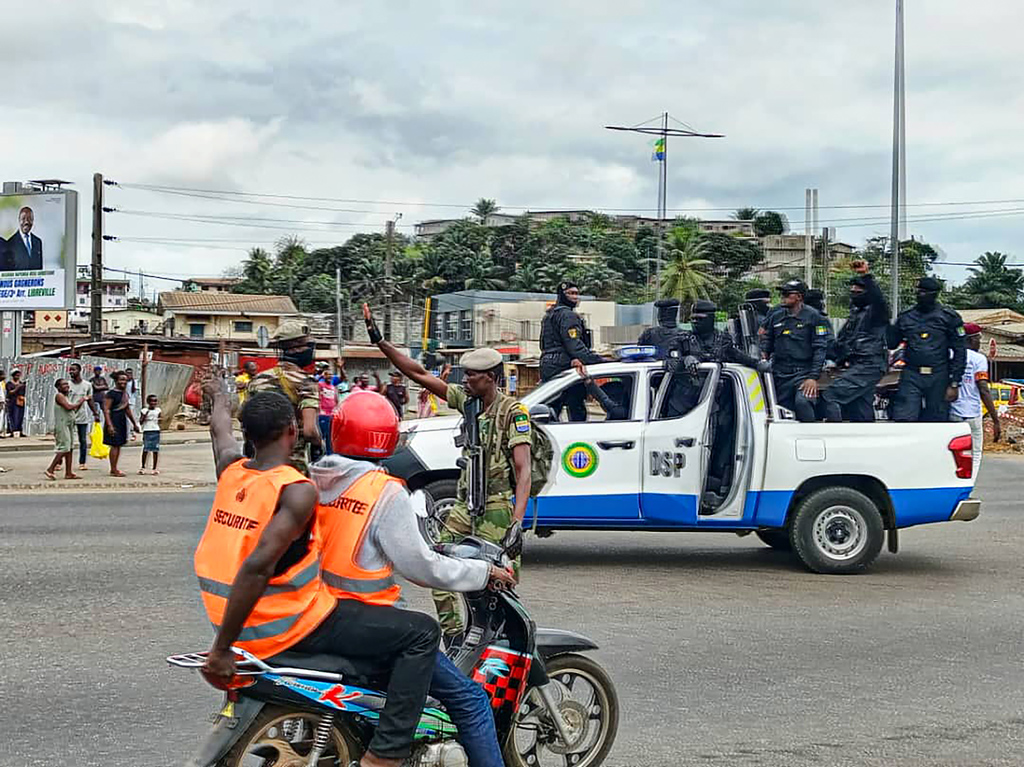 Officers from Department of Public Security (DSP) patrol as supporters of the military administration gather on a street after Gabonese army officers enter the national television building following the announcement of the presidential election results and announce that they take over, in Libreville, Gabon on August 30, 2023. (Photo credit: Stringer / AA)[/caption]
Gabon, a French colony in 1839, gained independence on Aug. 17, 1960. However, this independence is a far cry from complete independence. Leon Mba, who was elected Gabon's first president after independence, stayed in power with the support of France until he died in 1967. Omar Bongo, who served as the Foreign Minister, Defense Minister, and as the Communications Minister during Mba's term, last served as the vice president. However, after Mba's death, Omar Bongo was in power until 2009. After Omar Bongo died in 2009, although interim heads of state served in Gabon for about five months, Omar Bongo's son Ali Bongo was the head of Gabon until the current intervention. In other words, the Bongo family had been in power in Gabon as father and son for 56 years.
Colonial History
European colonization began in Africa toward the middle of the 15th century. Many European countries, such as France, Portugal, Spain, the Netherlands, Belgium, England, Italy, Germany, Denmark, and Sweden, were involved in the colonization of Africa. While carrying out their activities in Africa, European countries managed the colonial lands through direct and indirect methods, using assimilation and patronage.
In the regions where direct rule was practiced, Europeans intervened in the colonies' internal affairs. They managed the administrative units themselves, while in the regions that saw indirect rule, Europeans ensured that the colonies were administered through people chosen from among the local population. However, this did not mean that the local population influenced the colony. In other words, the locally elected administrators, who worked in harmony with the colonial country, acted according to the instructions and directions of the colonial countries. In short, in indirect rule, the ruler had limited power. Moreover, the colonial administration made the final decision on important issues. The colonial powers also used the method of assimilation, replacing a country's culture, language, and religion with its own. France was one of the countries that used this method the most.
Therefore, the victimization of people during the colonial period, the deprivation of their rights, and the changing and assimilation of their beliefs, cultures, and languages constitute the basis of today's problems. This situation contains the main factors that create national identity problems, coups, civil wars, and turmoil in today's African countries. In addition, transferring the African countries' resources to the colonialist powers instead of being used for the exploited country is also among the crucial problems.
Traces of Patrimonialism: Gabon
Each of the colonial powers of the past in Africa has a different style of politics. In this context, the use of violence as a method of persuasion stands out in France's colonial policy in Gabon. In addition, France practiced intimidation policies to prevent possible uprisings during the colonial period. In the history of France's colonialism in Africa, it is described in many sources that the persecution and massacre of local people reached very high levels. In addition to creating a vast colonial network in Africa through oppression, cruelty, and violence, France expanded its colonial territories by implementing its activities with a specific plan and discipline. France had a more centralized approach to colonialism.
At the end of colonialism, only actors mentally close to France were in power due to the French policies in those countries. This is how France was able to maintain its presence there. In fact, in this so-called post-colonial process, it is possible to come across administrations that resemble traditional family structures in France's former colonial territories. Indeed, France is doing this in West Africa or Central Africa and most of the states in its former colonial territories.
In Gabon, for example, the Bongo family has been in power for 53 years, while the same family has ruled Djibouti since independence in 1977. Between 1977 and 1999, Hassan Gouled Aptidon ruled Djibouti for 22 years. After Aptidon's death, his nephew Ismail Omar Guelleh has ruled the country since 1999. In other words, the same family has been in power for nearly half a century in Djibouti, a former French colony in terms of the structure established in the post-colonial period. Therefore, the structures created in the French colonial system and its aftermath provide essential clues for reading today's developments.
Poor governance, family (dynastic) rule, patrimonialism, injustice, economic problems, security problems, and more are at the heart of today's African problems. What should be considered, however, is that all these problems have their roots in past colonialism. Even though colonialism is over, the structures created in the post-colonial era influence the instabilities these countries are experiencing. For instance, the activities of France and other Western colonial powers prevented the colonized African societies from developing economically and led to the emergence of politically and socially weak structures.
What if it is different?
The military intervention in Gabon is different from that in Niger. In fact, the intervention in Gabon may have a weaker impact than in Niger. In other words, this intervention may be suppressed after a short period. However, it is also possible for Gabon to find a place for itself in this emerging ecosystem in Africa. After the developments in Niger, allying the juntas in Mali, Burkina Faso and Guinea was a harbinger of regional polarization. There are concerns that this polarization in West Africa and the Sahel will consolidate anti-French sentiments and spread to Central Africa, deepening instability. Again, anti-French discourses are likely to emerge following the developments in Gabon. Because anti-French discourses are very effective in society, in this context, the suspension of the operations of Emaret, known for its mining activities in Gabon, aims to consolidate the intervention in Gabon through anti-French rhetoric.
On the other hand, the uncertainty that emerged after the developments in Niger and the failure of the international system to provide an apparent response to this crisis may lead to the spread of instability in the region in particular and in sub-Saharan Africa in general. While the instability following the developments in Niger has the potential to shake the balance across the region, the developments in Gabon can be seen as an additional element that can affect the continent on the already fragile balances of the region. In a sense, the inability to respond effectively to the recent military interventions against the military regimes can be considered an encouraging factor for the groups dissatisfied with the events in different countries. The current tensions in the international system and the expectations of support from opposition groups, both within the military and the society, who think they can find support due to the Russia-West struggle, may suggest new interventions.
In addition, these developments in Africa and the increase in opposition can maybe called the "African Spring." However, it is also possible that the "Spring of Coups" discourse will soon take place in the process. However, beyond these conceptualizations, if African peoples want better governance and economic prosperity, it is essential to formulate comprehensive strategies for these purposes and regional stability, given the socio-economic conditions in Gabon and other intervention countries.
Moreover, perhaps the following question should be asked about the development in Gabon: "Could it be different from what it seems?" The recent perception that France has been expelled from former colonial countries should consider the possibility that France may have taken a preemptive and controlled initiative this time. France's operation could also prevent a possible intervention by different external actors.
Officers from Department of Public Security (DSP) patrol as supporters of the military administration gather on a street after Gabonese army officers enter the national television building following the announcement of the presidential election results and announce that they take over, in Libreville, Gabon on August 30, 2023. (Photo credit: Stringer / AA)[/caption]
Gabon, a French colony in 1839, gained independence on Aug. 17, 1960. However, this independence is a far cry from complete independence. Leon Mba, who was elected Gabon's first president after independence, stayed in power with the support of France until he died in 1967. Omar Bongo, who served as the Foreign Minister, Defense Minister, and as the Communications Minister during Mba's term, last served as the vice president. However, after Mba's death, Omar Bongo was in power until 2009. After Omar Bongo died in 2009, although interim heads of state served in Gabon for about five months, Omar Bongo's son Ali Bongo was the head of Gabon until the current intervention. In other words, the Bongo family had been in power in Gabon as father and son for 56 years.
Colonial History
European colonization began in Africa toward the middle of the 15th century. Many European countries, such as France, Portugal, Spain, the Netherlands, Belgium, England, Italy, Germany, Denmark, and Sweden, were involved in the colonization of Africa. While carrying out their activities in Africa, European countries managed the colonial lands through direct and indirect methods, using assimilation and patronage.
In the regions where direct rule was practiced, Europeans intervened in the colonies' internal affairs. They managed the administrative units themselves, while in the regions that saw indirect rule, Europeans ensured that the colonies were administered through people chosen from among the local population. However, this did not mean that the local population influenced the colony. In other words, the locally elected administrators, who worked in harmony with the colonial country, acted according to the instructions and directions of the colonial countries. In short, in indirect rule, the ruler had limited power. Moreover, the colonial administration made the final decision on important issues. The colonial powers also used the method of assimilation, replacing a country's culture, language, and religion with its own. France was one of the countries that used this method the most.
Therefore, the victimization of people during the colonial period, the deprivation of their rights, and the changing and assimilation of their beliefs, cultures, and languages constitute the basis of today's problems. This situation contains the main factors that create national identity problems, coups, civil wars, and turmoil in today's African countries. In addition, transferring the African countries' resources to the colonialist powers instead of being used for the exploited country is also among the crucial problems.
Traces of Patrimonialism: Gabon
Each of the colonial powers of the past in Africa has a different style of politics. In this context, the use of violence as a method of persuasion stands out in France's colonial policy in Gabon. In addition, France practiced intimidation policies to prevent possible uprisings during the colonial period. In the history of France's colonialism in Africa, it is described in many sources that the persecution and massacre of local people reached very high levels. In addition to creating a vast colonial network in Africa through oppression, cruelty, and violence, France expanded its colonial territories by implementing its activities with a specific plan and discipline. France had a more centralized approach to colonialism.
At the end of colonialism, only actors mentally close to France were in power due to the French policies in those countries. This is how France was able to maintain its presence there. In fact, in this so-called post-colonial process, it is possible to come across administrations that resemble traditional family structures in France's former colonial territories. Indeed, France is doing this in West Africa or Central Africa and most of the states in its former colonial territories.
In Gabon, for example, the Bongo family has been in power for 53 years, while the same family has ruled Djibouti since independence in 1977. Between 1977 and 1999, Hassan Gouled Aptidon ruled Djibouti for 22 years. After Aptidon's death, his nephew Ismail Omar Guelleh has ruled the country since 1999. In other words, the same family has been in power for nearly half a century in Djibouti, a former French colony in terms of the structure established in the post-colonial period. Therefore, the structures created in the French colonial system and its aftermath provide essential clues for reading today's developments.
Poor governance, family (dynastic) rule, patrimonialism, injustice, economic problems, security problems, and more are at the heart of today's African problems. What should be considered, however, is that all these problems have their roots in past colonialism. Even though colonialism is over, the structures created in the post-colonial era influence the instabilities these countries are experiencing. For instance, the activities of France and other Western colonial powers prevented the colonized African societies from developing economically and led to the emergence of politically and socially weak structures.
What if it is different?
The military intervention in Gabon is different from that in Niger. In fact, the intervention in Gabon may have a weaker impact than in Niger. In other words, this intervention may be suppressed after a short period. However, it is also possible for Gabon to find a place for itself in this emerging ecosystem in Africa. After the developments in Niger, allying the juntas in Mali, Burkina Faso and Guinea was a harbinger of regional polarization. There are concerns that this polarization in West Africa and the Sahel will consolidate anti-French sentiments and spread to Central Africa, deepening instability. Again, anti-French discourses are likely to emerge following the developments in Gabon. Because anti-French discourses are very effective in society, in this context, the suspension of the operations of Emaret, known for its mining activities in Gabon, aims to consolidate the intervention in Gabon through anti-French rhetoric.
On the other hand, the uncertainty that emerged after the developments in Niger and the failure of the international system to provide an apparent response to this crisis may lead to the spread of instability in the region in particular and in sub-Saharan Africa in general. While the instability following the developments in Niger has the potential to shake the balance across the region, the developments in Gabon can be seen as an additional element that can affect the continent on the already fragile balances of the region. In a sense, the inability to respond effectively to the recent military interventions against the military regimes can be considered an encouraging factor for the groups dissatisfied with the events in different countries. The current tensions in the international system and the expectations of support from opposition groups, both within the military and the society, who think they can find support due to the Russia-West struggle, may suggest new interventions.
In addition, these developments in Africa and the increase in opposition can maybe called the "African Spring." However, it is also possible that the "Spring of Coups" discourse will soon take place in the process. However, beyond these conceptualizations, if African peoples want better governance and economic prosperity, it is essential to formulate comprehensive strategies for these purposes and regional stability, given the socio-economic conditions in Gabon and other intervention countries.
Moreover, perhaps the following question should be asked about the development in Gabon: "Could it be different from what it seems?" The recent perception that France has been expelled from former colonial countries should consider the possibility that France may have taken a preemptive and controlled initiative this time. France's operation could also prevent a possible intervention by different external actors.
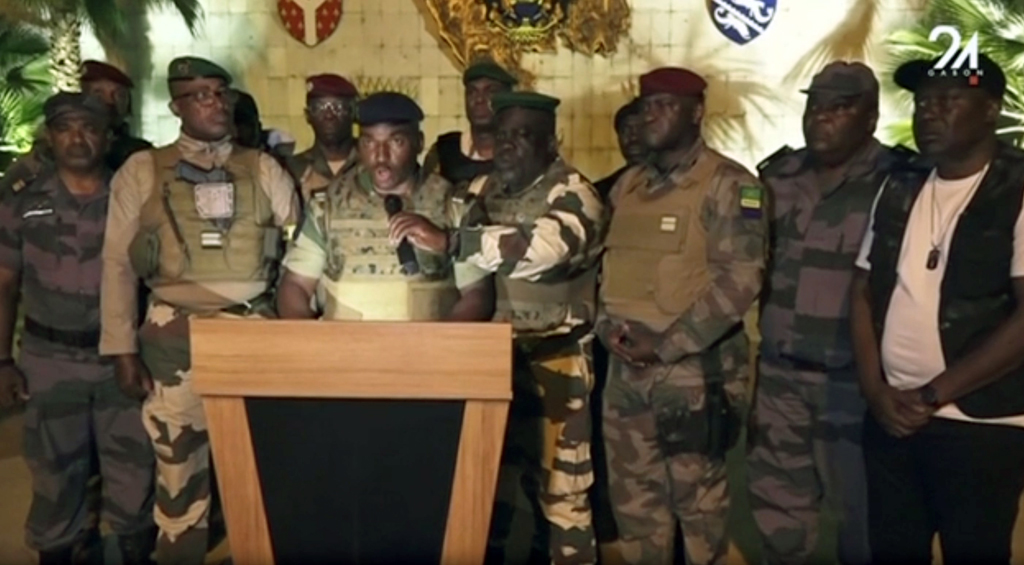
"African Spring"? or the "Spring of Coups"?: The Meaning of Developments in Africa
The African continent is currently facing a series of major problems and challenges today. Among them is a growing trend of military interventions particularly in West Africa and the Sahel region, the latest of which has taken place in the Central African country of Gabon. It was reportedly carried out under the leadership of General Brice Clotaire Oligui Nguema. After Mali, Burkina Faso, Guinea, and Niger, Gabon saw the eighth such incident since 2020 and it seems to have created a "coup ecosystem" in the continent. However, the development in Gabon should not be considered the same as Niger because the former has a structure other than the dynamics in Niger. The reasons for the intervention in Gabon also differ from the intervention in Niger. In this context, the Gabonese military intervention emerged due to political elections, while security concerns and poor governance drove the interventions in Niger and some other countries. After it was announced that Ali Bongo, who has been in power in Gabon for 14 years, received 64% of the votes in the elections held on Aug. 26, the army announced it had seized power. "On behalf of Gabonese people, we have decided to put an end to the current regime and defend peace," the group within the army said, adding that the election results were shady and the elections were to be canceled. However, it should be noted that the group within the army is led by Ali Bongo's cousin Nguema.
 Officers from Department of Public Security (DSP) patrol as supporters of the military administration gather on a street after Gabonese army officers enter the national television building following the announcement of the presidential election results and announce that they take over, in Libreville, Gabon on August 30, 2023. (Photo credit: Stringer / AA)[/caption]
Gabon, a French colony in 1839, gained independence on Aug. 17, 1960. However, this independence is a far cry from complete independence. Leon Mba, who was elected Gabon's first president after independence, stayed in power with the support of France until he died in 1967. Omar Bongo, who served as the Foreign Minister, Defense Minister, and as the Communications Minister during Mba's term, last served as the vice president. However, after Mba's death, Omar Bongo was in power until 2009. After Omar Bongo died in 2009, although interim heads of state served in Gabon for about five months, Omar Bongo's son Ali Bongo was the head of Gabon until the current intervention. In other words, the Bongo family had been in power in Gabon as father and son for 56 years.
Colonial History
European colonization began in Africa toward the middle of the 15th century. Many European countries, such as France, Portugal, Spain, the Netherlands, Belgium, England, Italy, Germany, Denmark, and Sweden, were involved in the colonization of Africa. While carrying out their activities in Africa, European countries managed the colonial lands through direct and indirect methods, using assimilation and patronage.
In the regions where direct rule was practiced, Europeans intervened in the colonies' internal affairs. They managed the administrative units themselves, while in the regions that saw indirect rule, Europeans ensured that the colonies were administered through people chosen from among the local population. However, this did not mean that the local population influenced the colony. In other words, the locally elected administrators, who worked in harmony with the colonial country, acted according to the instructions and directions of the colonial countries. In short, in indirect rule, the ruler had limited power. Moreover, the colonial administration made the final decision on important issues. The colonial powers also used the method of assimilation, replacing a country's culture, language, and religion with its own. France was one of the countries that used this method the most.
Therefore, the victimization of people during the colonial period, the deprivation of their rights, and the changing and assimilation of their beliefs, cultures, and languages constitute the basis of today's problems. This situation contains the main factors that create national identity problems, coups, civil wars, and turmoil in today's African countries. In addition, transferring the African countries' resources to the colonialist powers instead of being used for the exploited country is also among the crucial problems.
Traces of Patrimonialism: Gabon
Each of the colonial powers of the past in Africa has a different style of politics. In this context, the use of violence as a method of persuasion stands out in France's colonial policy in Gabon. In addition, France practiced intimidation policies to prevent possible uprisings during the colonial period. In the history of France's colonialism in Africa, it is described in many sources that the persecution and massacre of local people reached very high levels. In addition to creating a vast colonial network in Africa through oppression, cruelty, and violence, France expanded its colonial territories by implementing its activities with a specific plan and discipline. France had a more centralized approach to colonialism.
At the end of colonialism, only actors mentally close to France were in power due to the French policies in those countries. This is how France was able to maintain its presence there. In fact, in this so-called post-colonial process, it is possible to come across administrations that resemble traditional family structures in France's former colonial territories. Indeed, France is doing this in West Africa or Central Africa and most of the states in its former colonial territories.
In Gabon, for example, the Bongo family has been in power for 53 years, while the same family has ruled Djibouti since independence in 1977. Between 1977 and 1999, Hassan Gouled Aptidon ruled Djibouti for 22 years. After Aptidon's death, his nephew Ismail Omar Guelleh has ruled the country since 1999. In other words, the same family has been in power for nearly half a century in Djibouti, a former French colony in terms of the structure established in the post-colonial period. Therefore, the structures created in the French colonial system and its aftermath provide essential clues for reading today's developments.
Poor governance, family (dynastic) rule, patrimonialism, injustice, economic problems, security problems, and more are at the heart of today's African problems. What should be considered, however, is that all these problems have their roots in past colonialism. Even though colonialism is over, the structures created in the post-colonial era influence the instabilities these countries are experiencing. For instance, the activities of France and other Western colonial powers prevented the colonized African societies from developing economically and led to the emergence of politically and socially weak structures.
What if it is different?
The military intervention in Gabon is different from that in Niger. In fact, the intervention in Gabon may have a weaker impact than in Niger. In other words, this intervention may be suppressed after a short period. However, it is also possible for Gabon to find a place for itself in this emerging ecosystem in Africa. After the developments in Niger, allying the juntas in Mali, Burkina Faso and Guinea was a harbinger of regional polarization. There are concerns that this polarization in West Africa and the Sahel will consolidate anti-French sentiments and spread to Central Africa, deepening instability. Again, anti-French discourses are likely to emerge following the developments in Gabon. Because anti-French discourses are very effective in society, in this context, the suspension of the operations of Emaret, known for its mining activities in Gabon, aims to consolidate the intervention in Gabon through anti-French rhetoric.
On the other hand, the uncertainty that emerged after the developments in Niger and the failure of the international system to provide an apparent response to this crisis may lead to the spread of instability in the region in particular and in sub-Saharan Africa in general. While the instability following the developments in Niger has the potential to shake the balance across the region, the developments in Gabon can be seen as an additional element that can affect the continent on the already fragile balances of the region. In a sense, the inability to respond effectively to the recent military interventions against the military regimes can be considered an encouraging factor for the groups dissatisfied with the events in different countries. The current tensions in the international system and the expectations of support from opposition groups, both within the military and the society, who think they can find support due to the Russia-West struggle, may suggest new interventions.
In addition, these developments in Africa and the increase in opposition can maybe called the "African Spring." However, it is also possible that the "Spring of Coups" discourse will soon take place in the process. However, beyond these conceptualizations, if African peoples want better governance and economic prosperity, it is essential to formulate comprehensive strategies for these purposes and regional stability, given the socio-economic conditions in Gabon and other intervention countries.
Moreover, perhaps the following question should be asked about the development in Gabon: "Could it be different from what it seems?" The recent perception that France has been expelled from former colonial countries should consider the possibility that France may have taken a preemptive and controlled initiative this time. France's operation could also prevent a possible intervention by different external actors.
Officers from Department of Public Security (DSP) patrol as supporters of the military administration gather on a street after Gabonese army officers enter the national television building following the announcement of the presidential election results and announce that they take over, in Libreville, Gabon on August 30, 2023. (Photo credit: Stringer / AA)[/caption]
Gabon, a French colony in 1839, gained independence on Aug. 17, 1960. However, this independence is a far cry from complete independence. Leon Mba, who was elected Gabon's first president after independence, stayed in power with the support of France until he died in 1967. Omar Bongo, who served as the Foreign Minister, Defense Minister, and as the Communications Minister during Mba's term, last served as the vice president. However, after Mba's death, Omar Bongo was in power until 2009. After Omar Bongo died in 2009, although interim heads of state served in Gabon for about five months, Omar Bongo's son Ali Bongo was the head of Gabon until the current intervention. In other words, the Bongo family had been in power in Gabon as father and son for 56 years.
Colonial History
European colonization began in Africa toward the middle of the 15th century. Many European countries, such as France, Portugal, Spain, the Netherlands, Belgium, England, Italy, Germany, Denmark, and Sweden, were involved in the colonization of Africa. While carrying out their activities in Africa, European countries managed the colonial lands through direct and indirect methods, using assimilation and patronage.
In the regions where direct rule was practiced, Europeans intervened in the colonies' internal affairs. They managed the administrative units themselves, while in the regions that saw indirect rule, Europeans ensured that the colonies were administered through people chosen from among the local population. However, this did not mean that the local population influenced the colony. In other words, the locally elected administrators, who worked in harmony with the colonial country, acted according to the instructions and directions of the colonial countries. In short, in indirect rule, the ruler had limited power. Moreover, the colonial administration made the final decision on important issues. The colonial powers also used the method of assimilation, replacing a country's culture, language, and religion with its own. France was one of the countries that used this method the most.
Therefore, the victimization of people during the colonial period, the deprivation of their rights, and the changing and assimilation of their beliefs, cultures, and languages constitute the basis of today's problems. This situation contains the main factors that create national identity problems, coups, civil wars, and turmoil in today's African countries. In addition, transferring the African countries' resources to the colonialist powers instead of being used for the exploited country is also among the crucial problems.
Traces of Patrimonialism: Gabon
Each of the colonial powers of the past in Africa has a different style of politics. In this context, the use of violence as a method of persuasion stands out in France's colonial policy in Gabon. In addition, France practiced intimidation policies to prevent possible uprisings during the colonial period. In the history of France's colonialism in Africa, it is described in many sources that the persecution and massacre of local people reached very high levels. In addition to creating a vast colonial network in Africa through oppression, cruelty, and violence, France expanded its colonial territories by implementing its activities with a specific plan and discipline. France had a more centralized approach to colonialism.
At the end of colonialism, only actors mentally close to France were in power due to the French policies in those countries. This is how France was able to maintain its presence there. In fact, in this so-called post-colonial process, it is possible to come across administrations that resemble traditional family structures in France's former colonial territories. Indeed, France is doing this in West Africa or Central Africa and most of the states in its former colonial territories.
In Gabon, for example, the Bongo family has been in power for 53 years, while the same family has ruled Djibouti since independence in 1977. Between 1977 and 1999, Hassan Gouled Aptidon ruled Djibouti for 22 years. After Aptidon's death, his nephew Ismail Omar Guelleh has ruled the country since 1999. In other words, the same family has been in power for nearly half a century in Djibouti, a former French colony in terms of the structure established in the post-colonial period. Therefore, the structures created in the French colonial system and its aftermath provide essential clues for reading today's developments.
Poor governance, family (dynastic) rule, patrimonialism, injustice, economic problems, security problems, and more are at the heart of today's African problems. What should be considered, however, is that all these problems have their roots in past colonialism. Even though colonialism is over, the structures created in the post-colonial era influence the instabilities these countries are experiencing. For instance, the activities of France and other Western colonial powers prevented the colonized African societies from developing economically and led to the emergence of politically and socially weak structures.
What if it is different?
The military intervention in Gabon is different from that in Niger. In fact, the intervention in Gabon may have a weaker impact than in Niger. In other words, this intervention may be suppressed after a short period. However, it is also possible for Gabon to find a place for itself in this emerging ecosystem in Africa. After the developments in Niger, allying the juntas in Mali, Burkina Faso and Guinea was a harbinger of regional polarization. There are concerns that this polarization in West Africa and the Sahel will consolidate anti-French sentiments and spread to Central Africa, deepening instability. Again, anti-French discourses are likely to emerge following the developments in Gabon. Because anti-French discourses are very effective in society, in this context, the suspension of the operations of Emaret, known for its mining activities in Gabon, aims to consolidate the intervention in Gabon through anti-French rhetoric.
On the other hand, the uncertainty that emerged after the developments in Niger and the failure of the international system to provide an apparent response to this crisis may lead to the spread of instability in the region in particular and in sub-Saharan Africa in general. While the instability following the developments in Niger has the potential to shake the balance across the region, the developments in Gabon can be seen as an additional element that can affect the continent on the already fragile balances of the region. In a sense, the inability to respond effectively to the recent military interventions against the military regimes can be considered an encouraging factor for the groups dissatisfied with the events in different countries. The current tensions in the international system and the expectations of support from opposition groups, both within the military and the society, who think they can find support due to the Russia-West struggle, may suggest new interventions.
In addition, these developments in Africa and the increase in opposition can maybe called the "African Spring." However, it is also possible that the "Spring of Coups" discourse will soon take place in the process. However, beyond these conceptualizations, if African peoples want better governance and economic prosperity, it is essential to formulate comprehensive strategies for these purposes and regional stability, given the socio-economic conditions in Gabon and other intervention countries.
Moreover, perhaps the following question should be asked about the development in Gabon: "Could it be different from what it seems?" The recent perception that France has been expelled from former colonial countries should consider the possibility that France may have taken a preemptive and controlled initiative this time. France's operation could also prevent a possible intervention by different external actors.

